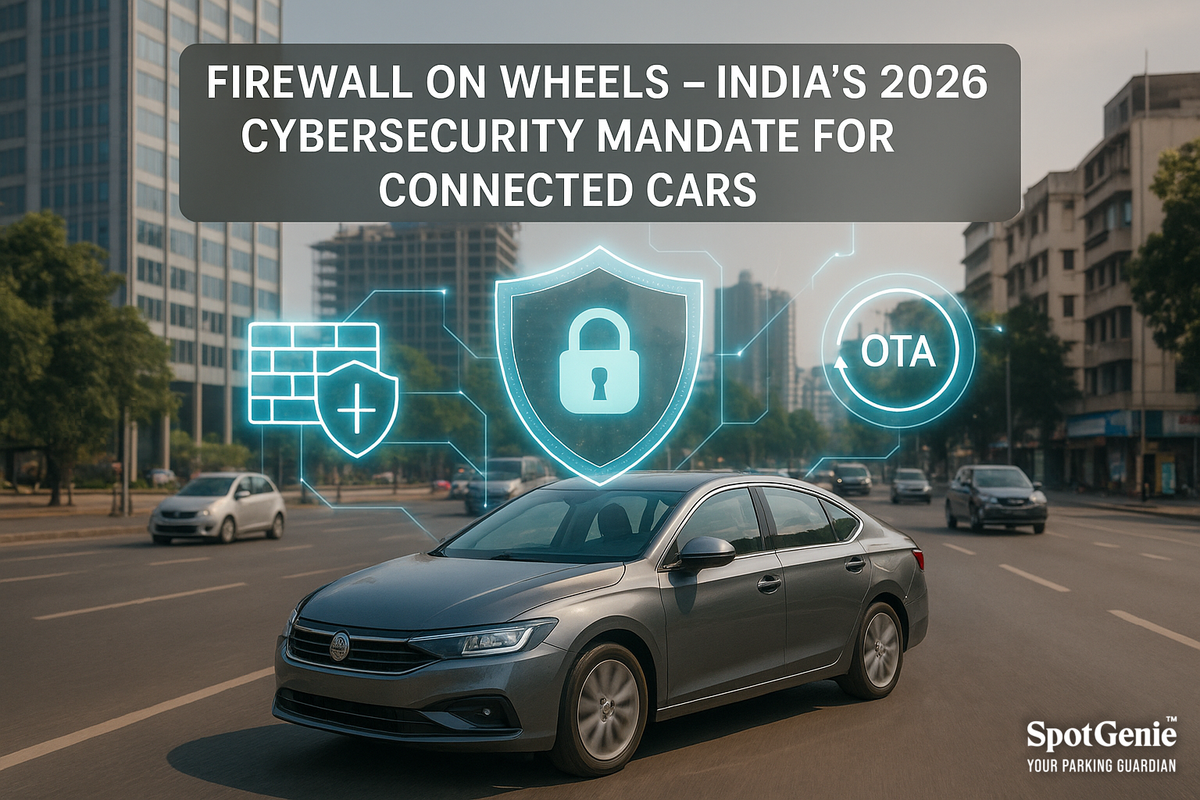Firewall on Wheels – India’s 2026 Cybersecurity Mandate for Connected Cars
India’s new AIS-190 standard will protect connected cars from cyber threats starting 2026. Learn what this means for you in today’s SpotGenie Gyaan.

India’s new AIS-190 standard will protect connected cars from cyber threats starting 2026. Learn what this means for you in today’s SpotGenie Gyaan.
SpotGenie Gyaan: Firewall on Wheels – India’s 2026 Cybersecurity Mandate for Connected Cars
SpotGenie’s Opening Whisper
🧞♂️ A car that drives itself, talks to traffic signals, and gets software updates over the air sounds futuristic — but it’s already here. The question is, how safe is it from hackers? With connected vehicles gaining momentum, India has taken a decisive step by mandating cybersecurity norms for all connected cars starting April 2026. Let’s decode the firewall now rolling on four wheels.
Latest Automotive Regulation
The Ministry of Road Transport and Highways (MoRTH), in collaboration with ARAI and BIS, has made the AIS-190 standard mandatory for all new connected vehicles sold in India from April 1, 2026. AIS-190 is based on the internationally accepted UNECE WP.29 R155 framework and lays down technical provisions to secure connected vehicles against cyber threats.
What does AIS-190 cover?
- End-to-end vehicle cybersecurity architecture
- Mandatory secure boot and encryption for OTA software updates
- Protection against unauthorized access to vehicle ECUs
- Real-time cyber threat detection and event logging systems
- Data isolation protocols for infotainment, telematics, and critical systems
This applies to all vehicles featuring:
- Telematics units (such as SIM-enabled or GPS trackers)
- Vehicle-to-Cloud or V2X (vehicle-to-infrastructure or vehicle-to-vehicle communication)
- Remote control/diagnostics via mobile apps
Keywords: AIS-190 India, connected car cybersecurity, automotive OTA protection, MoRTH cybersecurity 2026
What It Means for You
Connected cars offer features like remote air conditioning, GPS tracking, vehicle health alerts, and over-the-air updates. But without protection, these systems can become vulnerable access points for cybercriminals. Imagine a hacker disabling your brakes or unlocking your doors remotely — this isn’t fiction anymore.
With AIS-190, India aims to offer secure digital infrastructure on wheels. Buyers will soon see certification tags and compliance labels, offering assurance that the connected vehicle meets strict cybersecurity checks. More importantly, any automaker selling smart vehicles in India post-2026 must pass a certified audit and maintain a cyber incident response protocol.
The Deeper Jam
India’s cities are already witnessing the rise of smart mobility — from EVs with apps to fleet-operated ride-shares that use AI-based routing. The cybersecurity mandate ensures these innovations don’t become risks. Just like we have locks for physical doors, we now need firewalls for digital doors — especially as cars become moving data centers.
The AIS-190 also nudges India’s auto ecosystem closer to global best practices. The EU, Japan, and Korea have already enforced similar norms. By aligning with UNECE WP.29 R155, India becomes compliant for export markets and attracts more global OEM investments in local manufacturing hubs.
SpotGenie’s Daily Gyaan
“If your car knows where you are — make sure only you control what it does with that.” Cybersecurity is no longer an option — it’s the new seatbelt. 🧞♂️🔐
SpotGenie
SpotGenie may not install firmware updates or manage ECU security — but it contributes to a culture of accountability and real-time civic tech. As urban mobility becomes more digitized, SpotGenie encourages users to resolve misuse, report blocked zones, and improve traffic behavior using community-based digital alerts. It’s about trust — the same trust AIS-190 aims to secure.
Explore SpotGenie’s Urban Peacekeeping Tools
Trending Regulations & Sections
- AIS-190 Standard 2026: Cybersecurity compliance rule for all smart/connected passenger vehicles
- Motor Vehicle Safety Directive 211-C: Mandates annual audit logs and OTA software patch disclosures for vehicle makers
City Focus: Today’s Urban Lens
Pune, Bengaluru, and Gurugram are fast-emerging smart mobility clusters where connected cars, ride-sharing fleets, and IoT-enabled parking systems are common. Early cybersecurity pilots in Pune show significant drop in unauthorized remote access attempts on demo fleets once AIS-190-aligned software was installed.
Voices from the Road
"Glad we’re finally putting firewalls in cars — they’re basically smartphones on wheels now."
— @AutoTechWatch (Twitter)
"If it has an IP address, it needs protection. Good call, MoRTH."
— Reddit user: HackProofDriveIN
Your Move, India
If you’re considering a connected vehicle, ask about AIS-190 compliance. And if you already own one, ensure software is up to date and access is password protected. Safer roads now mean safer code. Spread the Gyaan.
SpotGenie’s Sign Off
🧞♂️ Cars have dashboards. Now they also need dashboards for security. Until next time — travel wise, code clean. #SpotGenieGyaan #GenieKnows
Follow us on:
🅾 Instagram |
ⓕ Facebook |
𝕏 X |
▶️ YouTube |
🟢 WhatsApp
🧱 More SpotGenie Gyaan – Tech, Policy & Smart Mobility in India
- India to Mandate Adaptive Headlights for Cars by 2026
- Upgraded ABS for Two-Wheelers – India’s Safety Upgrade by 2025
- India’s GPS Toll System Rolls Out – No More Toll Plazas
- EV Battery Swapping – New Standards Powering India’s 2025 Policy
- Get SpotGenie – Accountability, Alerts, and Safety on Urban Roads
This article is part of the SpotGenie Gyaan series — where mobility meets safety, technology meets trust, and India moves smarter every day.



